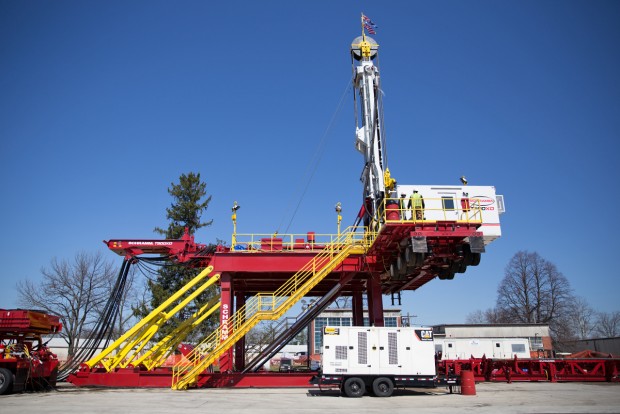
Natural gas wells in Springville Township, Pa.
Lindsay Lazarski / WHYY


Natural gas wells in Springville Township, Pa.
Lindsay Lazarski / WHYY

Lindsay Lazarski / WHYY
Natural gas wells in Springville Township, Pa.

Lindsay Lazarski/WHYY
After hitting a record low last year, natural gas impact fee revenue is expected to rise this year.
Pennsylvania is expected to bring in $46.1 million more this year from natural gas impact fees, according to an estimate published Wednesday by the state’s Independent Fiscal Office.
The IFO predicts the fees will raise $219.4 million — a nearly 27 percent increase from last year, when fee revenue hit a record low.
The IFO cites two reasons for the increase. The primary driver is an uptick in the average price of natural gas, which meant the fee schedule was adjusted upwards.
The fees, which companies pay each time they drill a well, are highest in the first year, and they can range from about $40,000 to $60,000 per well. As time goes by, the amounts decline – ending completely after 15 years. Without new drilling, older wells generate dwindling amounts of money. The IFO says 812 new wells drilled in 2017 helped offset reduced collections from older wells.
The fees have become an important source of money for local governments because 60 percent of the revenue stays in the regions where gas drilling occurs. The rest goes to various state agencies involved in regulating the industry and to the Marcellus Legacy Fund – which gets spread out around Pennsylvania.
The IFO also calculates an annual effective tax rate, to quantify the implicit tax burden imposed by the impact fee.
Collectively, companies produced more than 5.3 trillion cubic feet of natural gas in 2017, which means the fees amount to a 2.9 percent effective tax rate. That’s down from a 4.9 percent rate last year. The highest rate was 6.9 percent in 2015.
StateImpact Pennsylvania is a collaboration among WITF, WHYY, and the Allegheny Front. Reporters Reid Frazier, Rachel McDevitt and Susan Phillips cover the commonwealth’s energy economy. Read their reports on this site, and hear them on public radio stations across Pennsylvania.
(listed by story count)
StateImpact Pennsylvania is a collaboration among WITF, WHYY, and the Allegheny Front. Reporters Reid Frazier, Rachel McDevitt and Susan Phillips cover the commonwealth’s energy economy. Read their reports on this site, and hear them on public radio stations across Pennsylvania.
Climate Solutions, a collaboration of news organizations, educational institutions and a theater company, uses engagement, education and storytelling to help central Pennsylvanians toward climate change literacy, resilience and adaptation. Our work will amplify how people are finding solutions to the challenges presented by a warming world.